Exploring Positive Psychology: A Reflective Journal on Self Analysis
VerifiedAdded on 2024/06/27
|9
|1947
|255
AI Summary
This reflective journal explores the application of positive psychology principles to personal and professional development. It delves into understanding personal strengths and weaknesses, developing character strengths like curiosity and kindness, and overcoming self-criticism. The journal also discusses the importance of grit, determination, and the impact of personality traits on performance. Furthermore, it examines resilience, optimism, and hope as crucial elements for managing challenges and achieving goals. The author reflects on using positive psychology to optimize performance, enhance well-being, and foster a positive work environment, emphasizing the role of positive emotions, engagement, and strong relationships in achieving personal and organizational success. This document is available on Desklib, a platform providing a wide range of study resources for students.
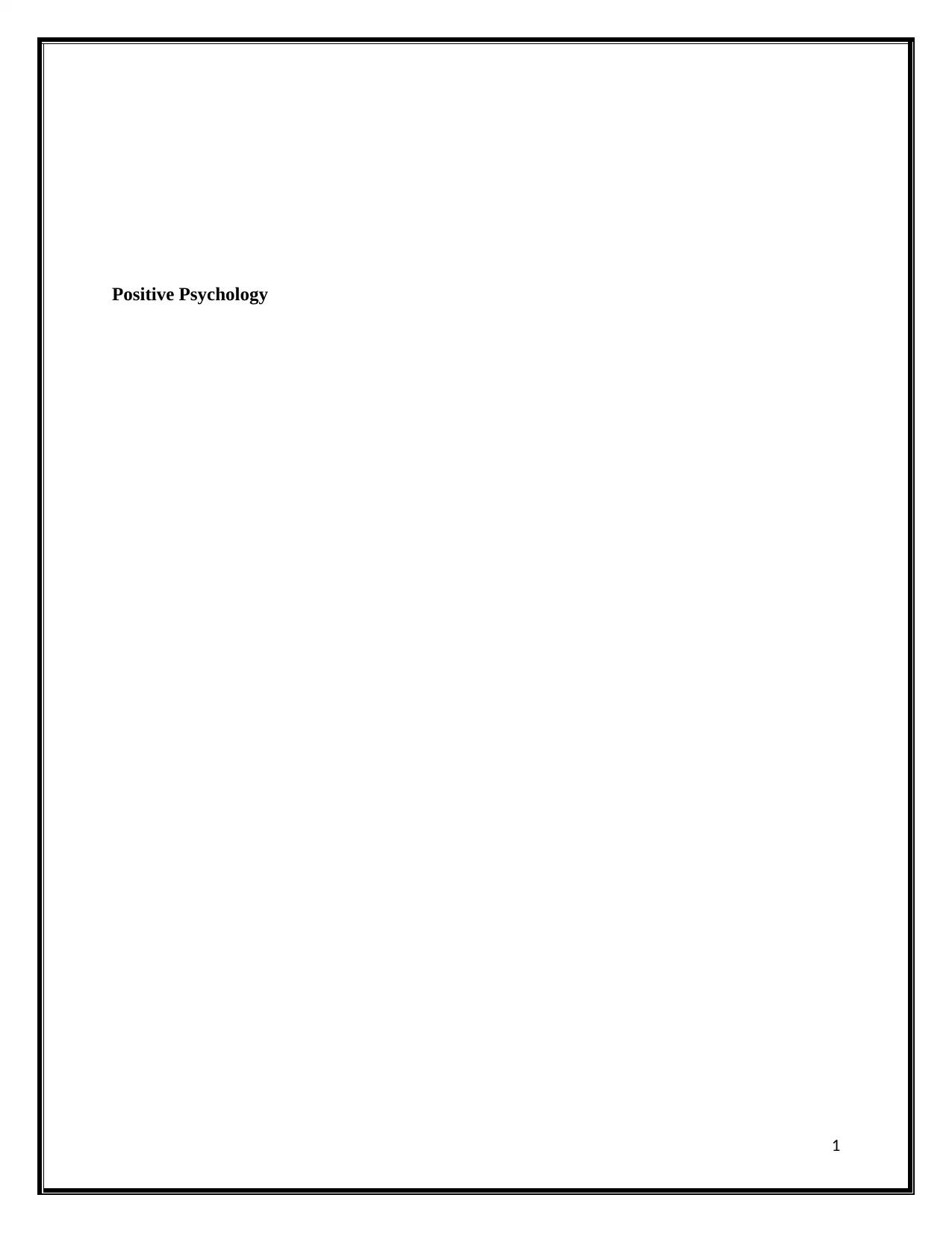
Positive Psychology
1
1
Paraphrase This Document
Need a fresh take? Get an instant paraphrase of this document with our AI Paraphraser
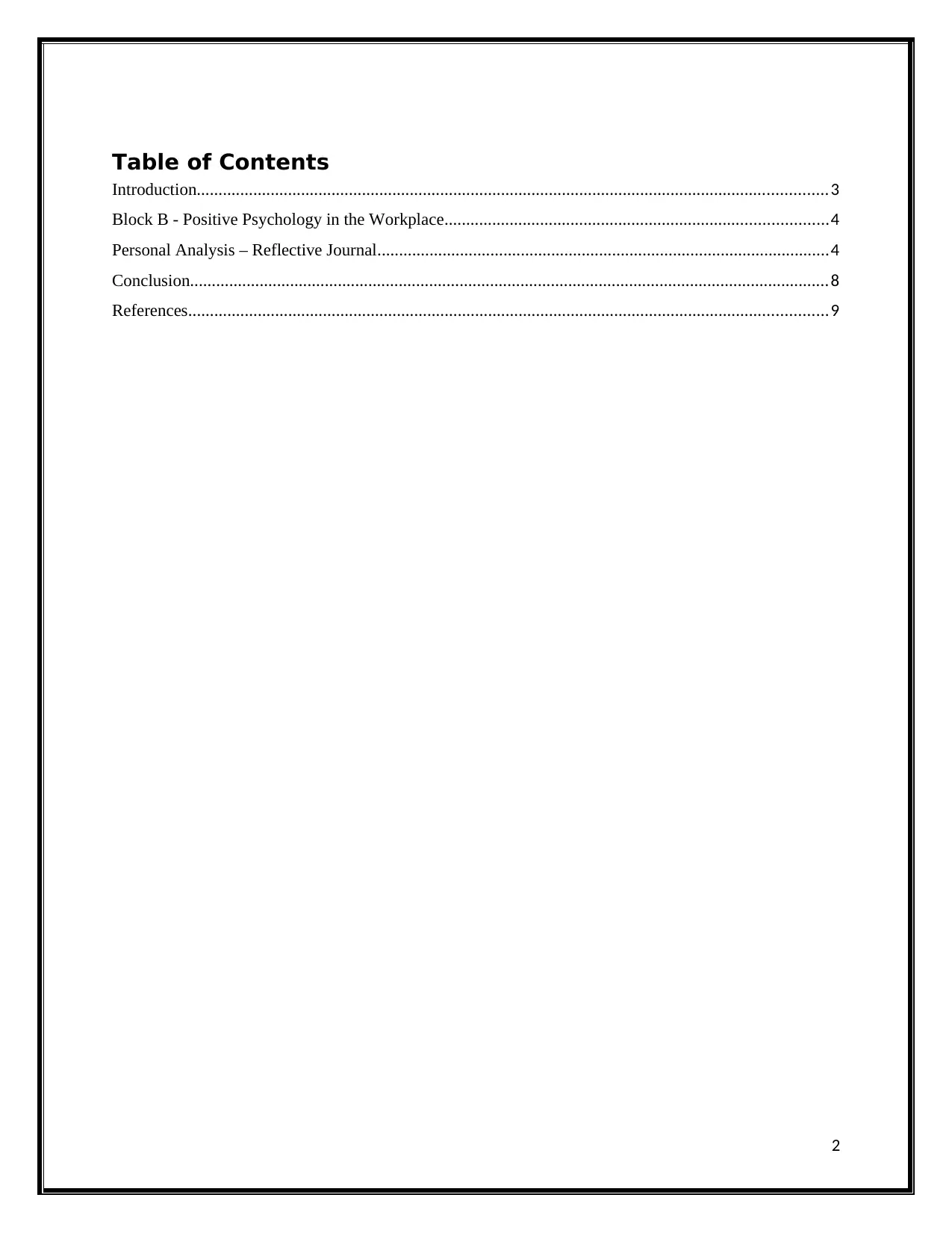
Table of Contents
Introduction.................................................................................................................................................3
Block B - Positive Psychology in the Workplace........................................................................................4
Personal Analysis – Reflective Journal........................................................................................................4
Conclusion...................................................................................................................................................8
References...................................................................................................................................................9
2
Introduction.................................................................................................................................................3
Block B - Positive Psychology in the Workplace........................................................................................4
Personal Analysis – Reflective Journal........................................................................................................4
Conclusion...................................................................................................................................................8
References...................................................................................................................................................9
2
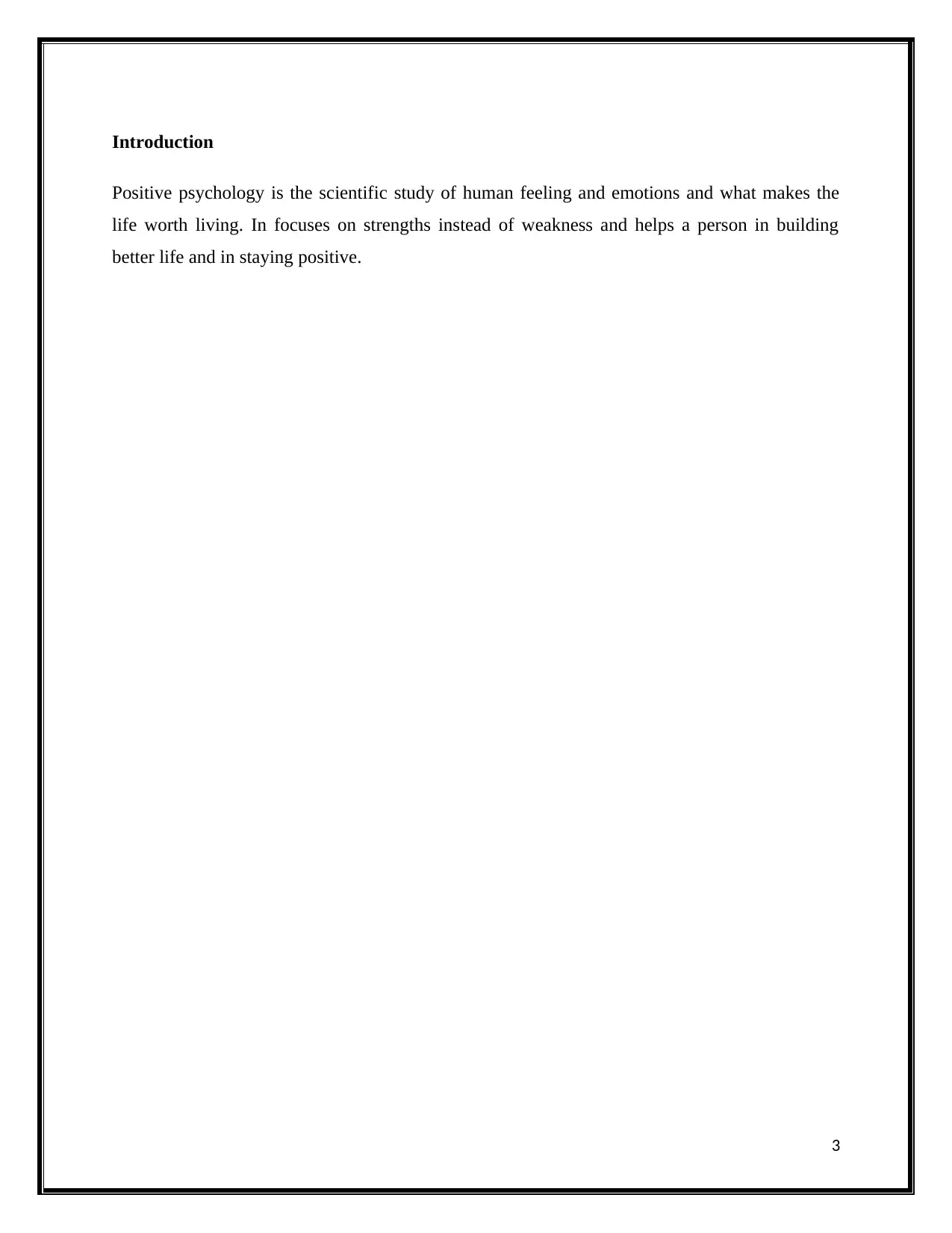
Introduction
Positive psychology is the scientific study of human feeling and emotions and what makes the
life worth living. In focuses on strengths instead of weakness and helps a person in building
better life and in staying positive.
3
Positive psychology is the scientific study of human feeling and emotions and what makes the
life worth living. In focuses on strengths instead of weakness and helps a person in building
better life and in staying positive.
3
⊘ This is a preview!⊘
Do you want full access?
Subscribe today to unlock all pages.

Trusted by 1+ million students worldwide
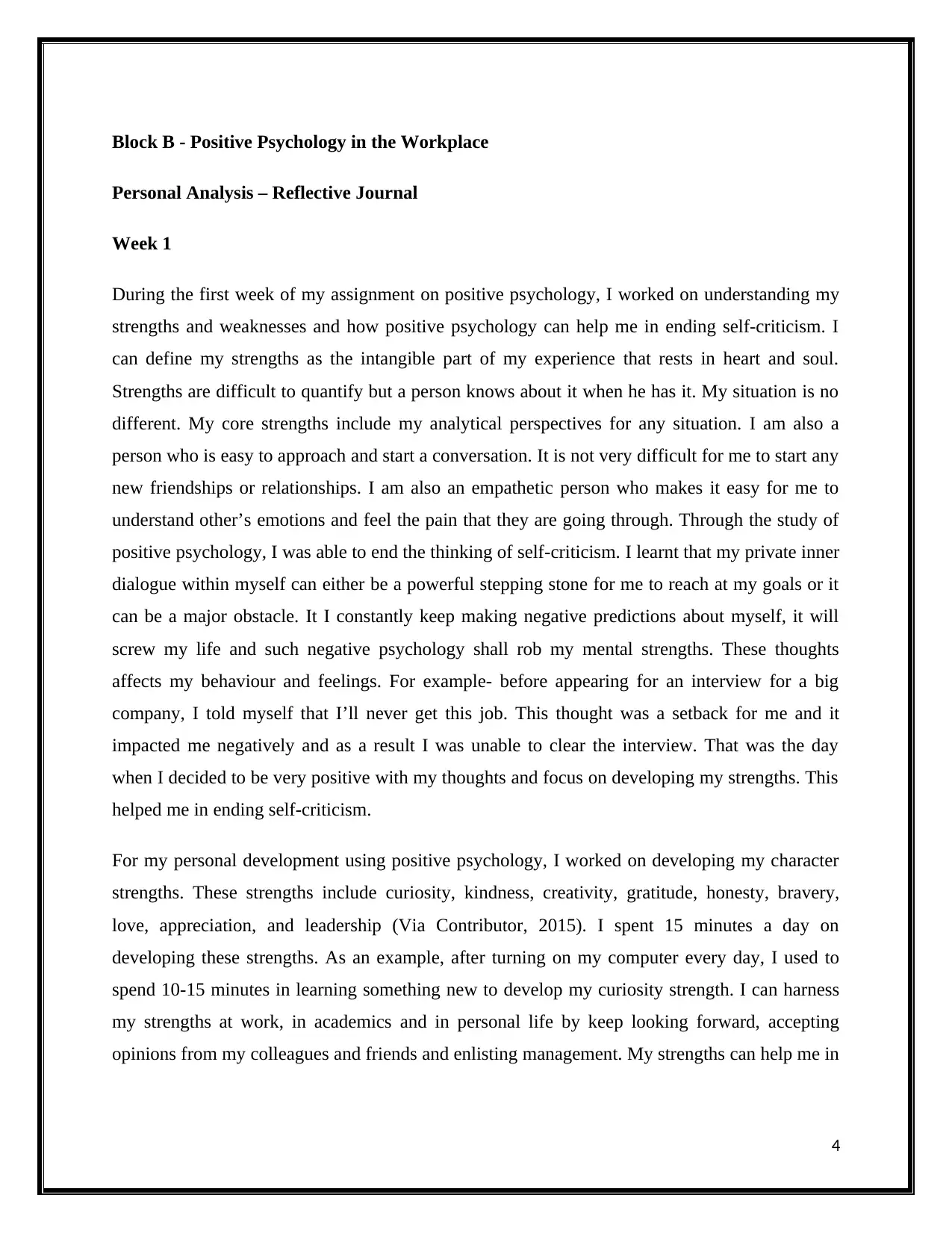
Block B - Positive Psychology in the Workplace
Personal Analysis – Reflective Journal
Week 1
During the first week of my assignment on positive psychology, I worked on understanding my
strengths and weaknesses and how positive psychology can help me in ending self-criticism. I
can define my strengths as the intangible part of my experience that rests in heart and soul.
Strengths are difficult to quantify but a person knows about it when he has it. My situation is no
different. My core strengths include my analytical perspectives for any situation. I am also a
person who is easy to approach and start a conversation. It is not very difficult for me to start any
new friendships or relationships. I am also an empathetic person who makes it easy for me to
understand other’s emotions and feel the pain that they are going through. Through the study of
positive psychology, I was able to end the thinking of self-criticism. I learnt that my private inner
dialogue within myself can either be a powerful stepping stone for me to reach at my goals or it
can be a major obstacle. It I constantly keep making negative predictions about myself, it will
screw my life and such negative psychology shall rob my mental strengths. These thoughts
affects my behaviour and feelings. For example- before appearing for an interview for a big
company, I told myself that I’ll never get this job. This thought was a setback for me and it
impacted me negatively and as a result I was unable to clear the interview. That was the day
when I decided to be very positive with my thoughts and focus on developing my strengths. This
helped me in ending self-criticism.
For my personal development using positive psychology, I worked on developing my character
strengths. These strengths include curiosity, kindness, creativity, gratitude, honesty, bravery,
love, appreciation, and leadership (Via Contributor, 2015). I spent 15 minutes a day on
developing these strengths. As an example, after turning on my computer every day, I used to
spend 10-15 minutes in learning something new to develop my curiosity strength. I can harness
my strengths at work, in academics and in personal life by keep looking forward, accepting
opinions from my colleagues and friends and enlisting management. My strengths can help me in
4
Personal Analysis – Reflective Journal
Week 1
During the first week of my assignment on positive psychology, I worked on understanding my
strengths and weaknesses and how positive psychology can help me in ending self-criticism. I
can define my strengths as the intangible part of my experience that rests in heart and soul.
Strengths are difficult to quantify but a person knows about it when he has it. My situation is no
different. My core strengths include my analytical perspectives for any situation. I am also a
person who is easy to approach and start a conversation. It is not very difficult for me to start any
new friendships or relationships. I am also an empathetic person who makes it easy for me to
understand other’s emotions and feel the pain that they are going through. Through the study of
positive psychology, I was able to end the thinking of self-criticism. I learnt that my private inner
dialogue within myself can either be a powerful stepping stone for me to reach at my goals or it
can be a major obstacle. It I constantly keep making negative predictions about myself, it will
screw my life and such negative psychology shall rob my mental strengths. These thoughts
affects my behaviour and feelings. For example- before appearing for an interview for a big
company, I told myself that I’ll never get this job. This thought was a setback for me and it
impacted me negatively and as a result I was unable to clear the interview. That was the day
when I decided to be very positive with my thoughts and focus on developing my strengths. This
helped me in ending self-criticism.
For my personal development using positive psychology, I worked on developing my character
strengths. These strengths include curiosity, kindness, creativity, gratitude, honesty, bravery,
love, appreciation, and leadership (Via Contributor, 2015). I spent 15 minutes a day on
developing these strengths. As an example, after turning on my computer every day, I used to
spend 10-15 minutes in learning something new to develop my curiosity strength. I can harness
my strengths at work, in academics and in personal life by keep looking forward, accepting
opinions from my colleagues and friends and enlisting management. My strengths can help me in
4
Paraphrase This Document
Need a fresh take? Get an instant paraphrase of this document with our AI Paraphraser
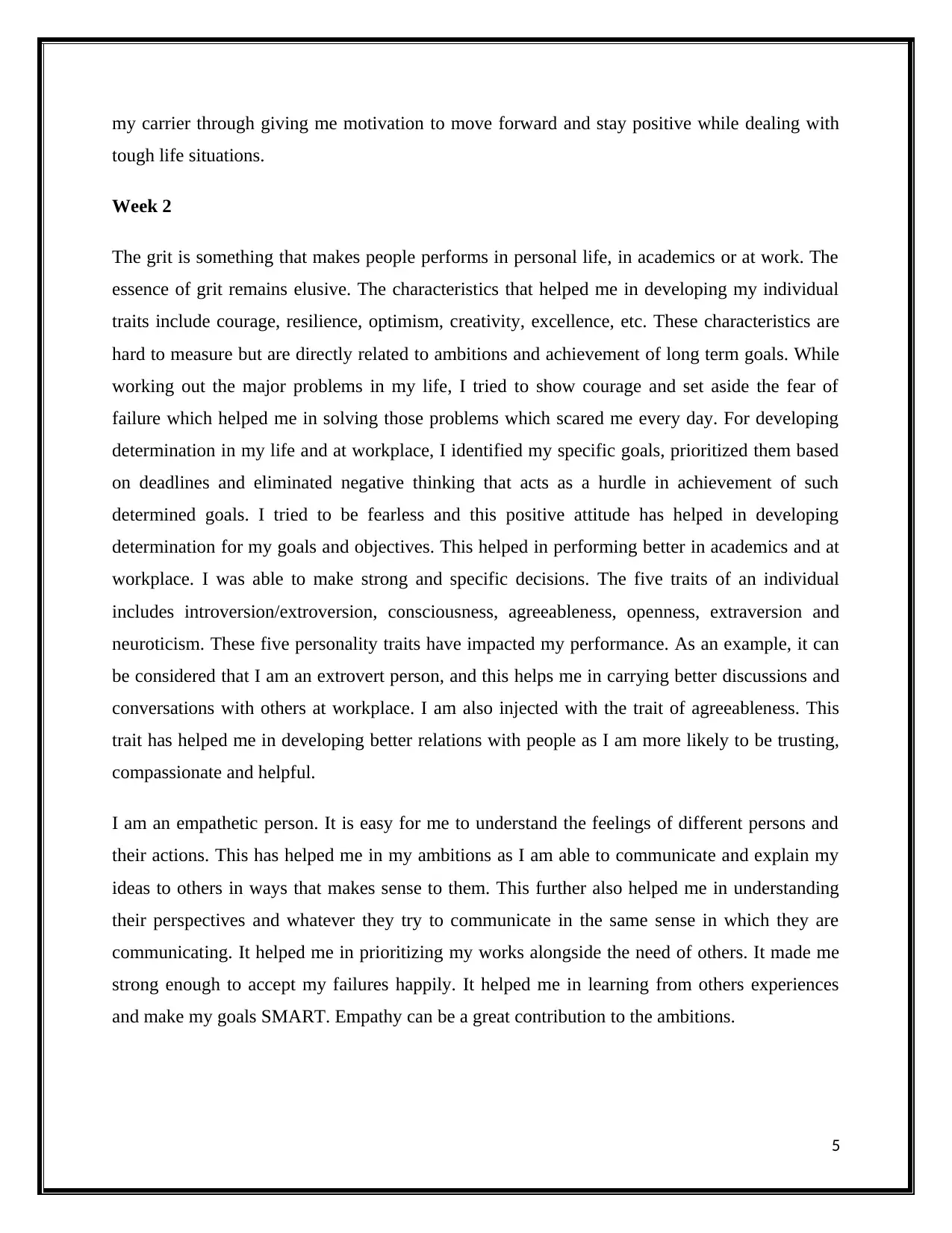
my carrier through giving me motivation to move forward and stay positive while dealing with
tough life situations.
Week 2
The grit is something that makes people performs in personal life, in academics or at work. The
essence of grit remains elusive. The characteristics that helped me in developing my individual
traits include courage, resilience, optimism, creativity, excellence, etc. These characteristics are
hard to measure but are directly related to ambitions and achievement of long term goals. While
working out the major problems in my life, I tried to show courage and set aside the fear of
failure which helped me in solving those problems which scared me every day. For developing
determination in my life and at workplace, I identified my specific goals, prioritized them based
on deadlines and eliminated negative thinking that acts as a hurdle in achievement of such
determined goals. I tried to be fearless and this positive attitude has helped in developing
determination for my goals and objectives. This helped in performing better in academics and at
workplace. I was able to make strong and specific decisions. The five traits of an individual
includes introversion/extroversion, consciousness, agreeableness, openness, extraversion and
neuroticism. These five personality traits have impacted my performance. As an example, it can
be considered that I am an extrovert person, and this helps me in carrying better discussions and
conversations with others at workplace. I am also injected with the trait of agreeableness. This
trait has helped me in developing better relations with people as I am more likely to be trusting,
compassionate and helpful.
I am an empathetic person. It is easy for me to understand the feelings of different persons and
their actions. This has helped me in my ambitions as I am able to communicate and explain my
ideas to others in ways that makes sense to them. This further also helped me in understanding
their perspectives and whatever they try to communicate in the same sense in which they are
communicating. It helped me in prioritizing my works alongside the need of others. It made me
strong enough to accept my failures happily. It helped me in learning from others experiences
and make my goals SMART. Empathy can be a great contribution to the ambitions.
5
tough life situations.
Week 2
The grit is something that makes people performs in personal life, in academics or at work. The
essence of grit remains elusive. The characteristics that helped me in developing my individual
traits include courage, resilience, optimism, creativity, excellence, etc. These characteristics are
hard to measure but are directly related to ambitions and achievement of long term goals. While
working out the major problems in my life, I tried to show courage and set aside the fear of
failure which helped me in solving those problems which scared me every day. For developing
determination in my life and at workplace, I identified my specific goals, prioritized them based
on deadlines and eliminated negative thinking that acts as a hurdle in achievement of such
determined goals. I tried to be fearless and this positive attitude has helped in developing
determination for my goals and objectives. This helped in performing better in academics and at
workplace. I was able to make strong and specific decisions. The five traits of an individual
includes introversion/extroversion, consciousness, agreeableness, openness, extraversion and
neuroticism. These five personality traits have impacted my performance. As an example, it can
be considered that I am an extrovert person, and this helps me in carrying better discussions and
conversations with others at workplace. I am also injected with the trait of agreeableness. This
trait has helped me in developing better relations with people as I am more likely to be trusting,
compassionate and helpful.
I am an empathetic person. It is easy for me to understand the feelings of different persons and
their actions. This has helped me in my ambitions as I am able to communicate and explain my
ideas to others in ways that makes sense to them. This further also helped me in understanding
their perspectives and whatever they try to communicate in the same sense in which they are
communicating. It helped me in prioritizing my works alongside the need of others. It made me
strong enough to accept my failures happily. It helped me in learning from others experiences
and make my goals SMART. Empathy can be a great contribution to the ambitions.
5
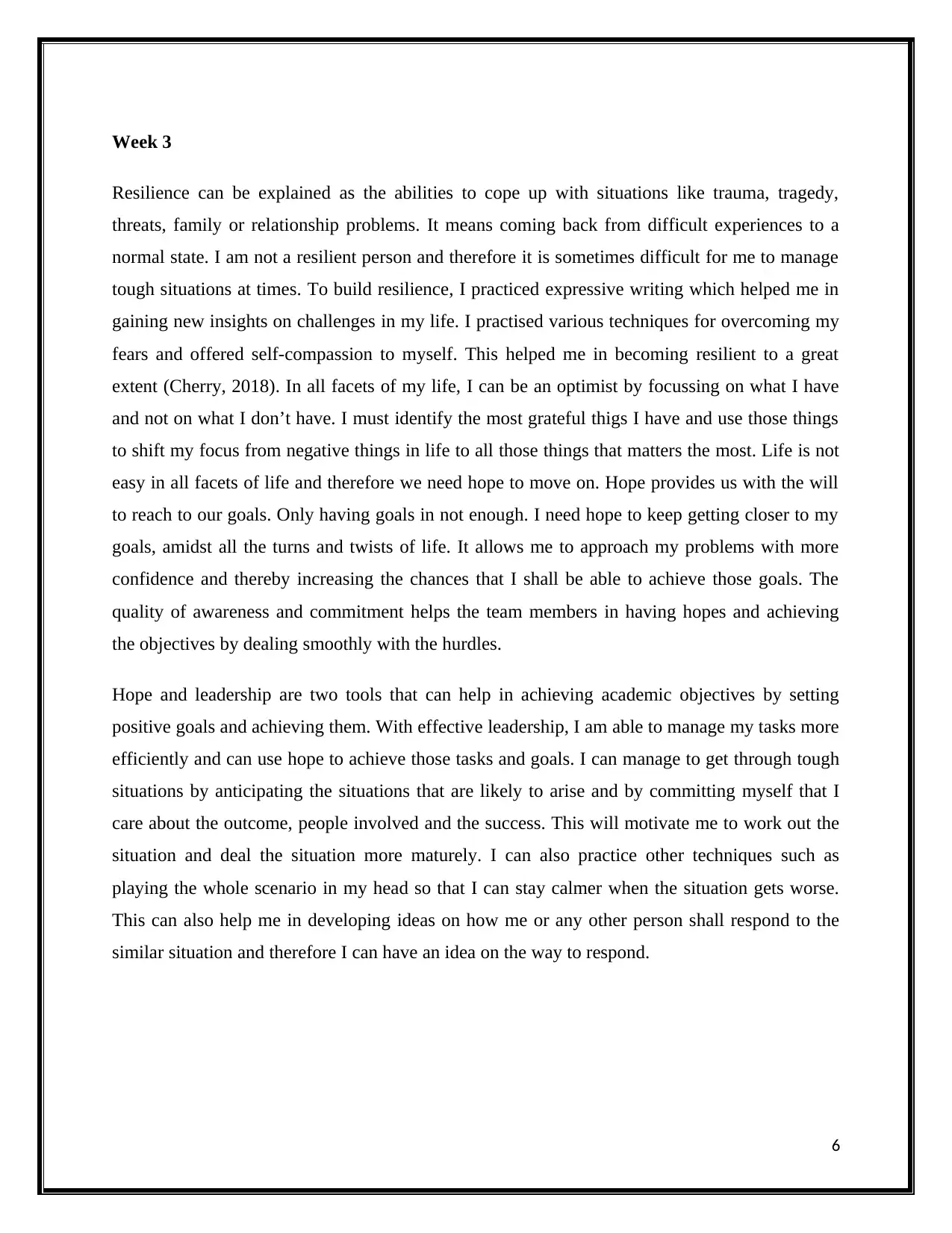
Week 3
Resilience can be explained as the abilities to cope up with situations like trauma, tragedy,
threats, family or relationship problems. It means coming back from difficult experiences to a
normal state. I am not a resilient person and therefore it is sometimes difficult for me to manage
tough situations at times. To build resilience, I practiced expressive writing which helped me in
gaining new insights on challenges in my life. I practised various techniques for overcoming my
fears and offered self-compassion to myself. This helped me in becoming resilient to a great
extent (Cherry, 2018). In all facets of my life, I can be an optimist by focussing on what I have
and not on what I don’t have. I must identify the most grateful thigs I have and use those things
to shift my focus from negative things in life to all those things that matters the most. Life is not
easy in all facets of life and therefore we need hope to move on. Hope provides us with the will
to reach to our goals. Only having goals in not enough. I need hope to keep getting closer to my
goals, amidst all the turns and twists of life. It allows me to approach my problems with more
confidence and thereby increasing the chances that I shall be able to achieve those goals. The
quality of awareness and commitment helps the team members in having hopes and achieving
the objectives by dealing smoothly with the hurdles.
Hope and leadership are two tools that can help in achieving academic objectives by setting
positive goals and achieving them. With effective leadership, I am able to manage my tasks more
efficiently and can use hope to achieve those tasks and goals. I can manage to get through tough
situations by anticipating the situations that are likely to arise and by committing myself that I
care about the outcome, people involved and the success. This will motivate me to work out the
situation and deal the situation more maturely. I can also practice other techniques such as
playing the whole scenario in my head so that I can stay calmer when the situation gets worse.
This can also help me in developing ideas on how me or any other person shall respond to the
similar situation and therefore I can have an idea on the way to respond.
6
Resilience can be explained as the abilities to cope up with situations like trauma, tragedy,
threats, family or relationship problems. It means coming back from difficult experiences to a
normal state. I am not a resilient person and therefore it is sometimes difficult for me to manage
tough situations at times. To build resilience, I practiced expressive writing which helped me in
gaining new insights on challenges in my life. I practised various techniques for overcoming my
fears and offered self-compassion to myself. This helped me in becoming resilient to a great
extent (Cherry, 2018). In all facets of my life, I can be an optimist by focussing on what I have
and not on what I don’t have. I must identify the most grateful thigs I have and use those things
to shift my focus from negative things in life to all those things that matters the most. Life is not
easy in all facets of life and therefore we need hope to move on. Hope provides us with the will
to reach to our goals. Only having goals in not enough. I need hope to keep getting closer to my
goals, amidst all the turns and twists of life. It allows me to approach my problems with more
confidence and thereby increasing the chances that I shall be able to achieve those goals. The
quality of awareness and commitment helps the team members in having hopes and achieving
the objectives by dealing smoothly with the hurdles.
Hope and leadership are two tools that can help in achieving academic objectives by setting
positive goals and achieving them. With effective leadership, I am able to manage my tasks more
efficiently and can use hope to achieve those tasks and goals. I can manage to get through tough
situations by anticipating the situations that are likely to arise and by committing myself that I
care about the outcome, people involved and the success. This will motivate me to work out the
situation and deal the situation more maturely. I can also practice other techniques such as
playing the whole scenario in my head so that I can stay calmer when the situation gets worse.
This can also help me in developing ideas on how me or any other person shall respond to the
similar situation and therefore I can have an idea on the way to respond.
6
⊘ This is a preview!⊘
Do you want full access?
Subscribe today to unlock all pages.

Trusted by 1+ million students worldwide
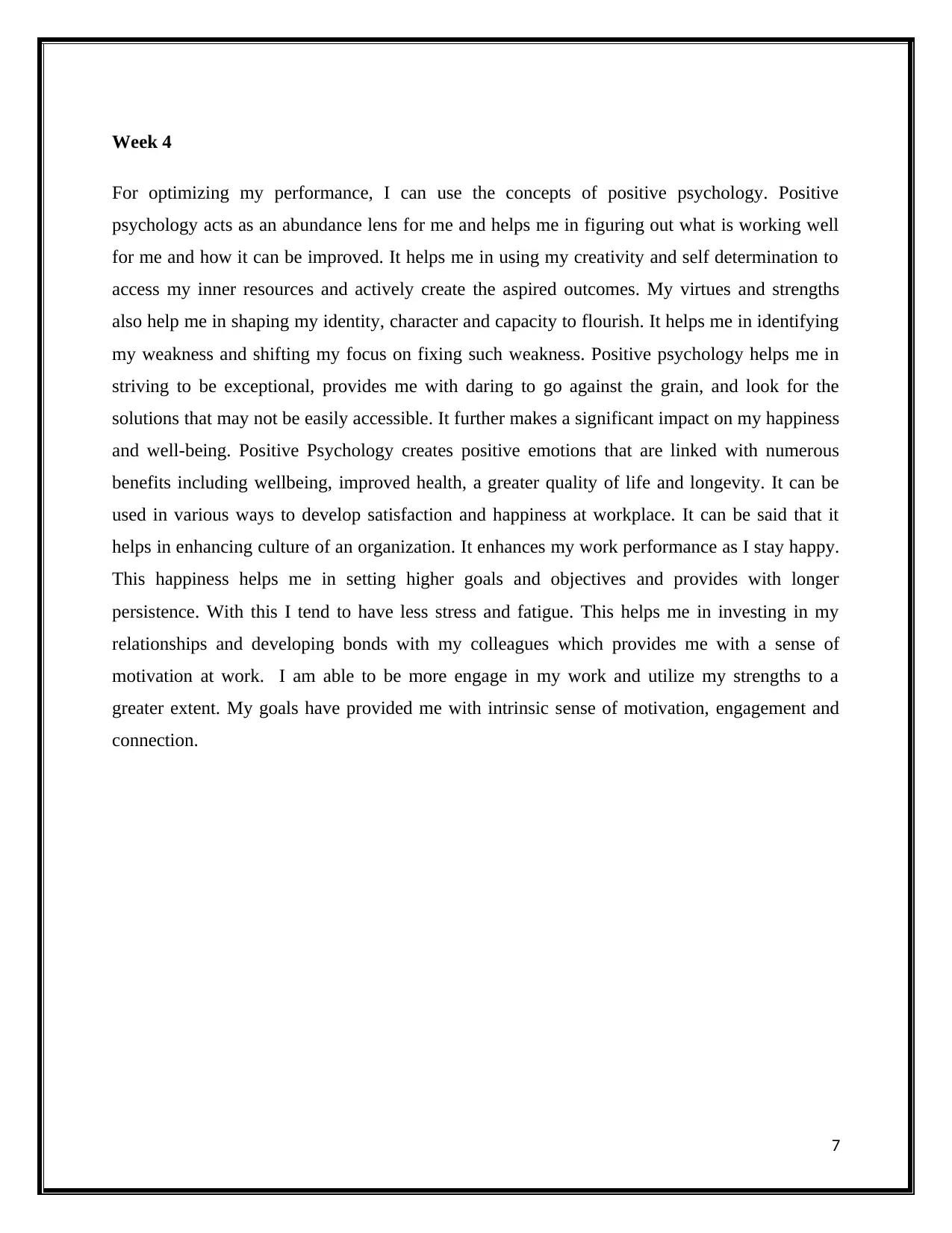
Week 4
For optimizing my performance, I can use the concepts of positive psychology. Positive
psychology acts as an abundance lens for me and helps me in figuring out what is working well
for me and how it can be improved. It helps me in using my creativity and self determination to
access my inner resources and actively create the aspired outcomes. My virtues and strengths
also help me in shaping my identity, character and capacity to flourish. It helps me in identifying
my weakness and shifting my focus on fixing such weakness. Positive psychology helps me in
striving to be exceptional, provides me with daring to go against the grain, and look for the
solutions that may not be easily accessible. It further makes a significant impact on my happiness
and well-being. Positive Psychology creates positive emotions that are linked with numerous
benefits including wellbeing, improved health, a greater quality of life and longevity. It can be
used in various ways to develop satisfaction and happiness at workplace. It can be said that it
helps in enhancing culture of an organization. It enhances my work performance as I stay happy.
This happiness helps me in setting higher goals and objectives and provides with longer
persistence. With this I tend to have less stress and fatigue. This helps me in investing in my
relationships and developing bonds with my colleagues which provides me with a sense of
motivation at work. I am able to be more engage in my work and utilize my strengths to a
greater extent. My goals have provided me with intrinsic sense of motivation, engagement and
connection.
7
For optimizing my performance, I can use the concepts of positive psychology. Positive
psychology acts as an abundance lens for me and helps me in figuring out what is working well
for me and how it can be improved. It helps me in using my creativity and self determination to
access my inner resources and actively create the aspired outcomes. My virtues and strengths
also help me in shaping my identity, character and capacity to flourish. It helps me in identifying
my weakness and shifting my focus on fixing such weakness. Positive psychology helps me in
striving to be exceptional, provides me with daring to go against the grain, and look for the
solutions that may not be easily accessible. It further makes a significant impact on my happiness
and well-being. Positive Psychology creates positive emotions that are linked with numerous
benefits including wellbeing, improved health, a greater quality of life and longevity. It can be
used in various ways to develop satisfaction and happiness at workplace. It can be said that it
helps in enhancing culture of an organization. It enhances my work performance as I stay happy.
This happiness helps me in setting higher goals and objectives and provides with longer
persistence. With this I tend to have less stress and fatigue. This helps me in investing in my
relationships and developing bonds with my colleagues which provides me with a sense of
motivation at work. I am able to be more engage in my work and utilize my strengths to a
greater extent. My goals have provided me with intrinsic sense of motivation, engagement and
connection.
7
Paraphrase This Document
Need a fresh take? Get an instant paraphrase of this document with our AI Paraphraser
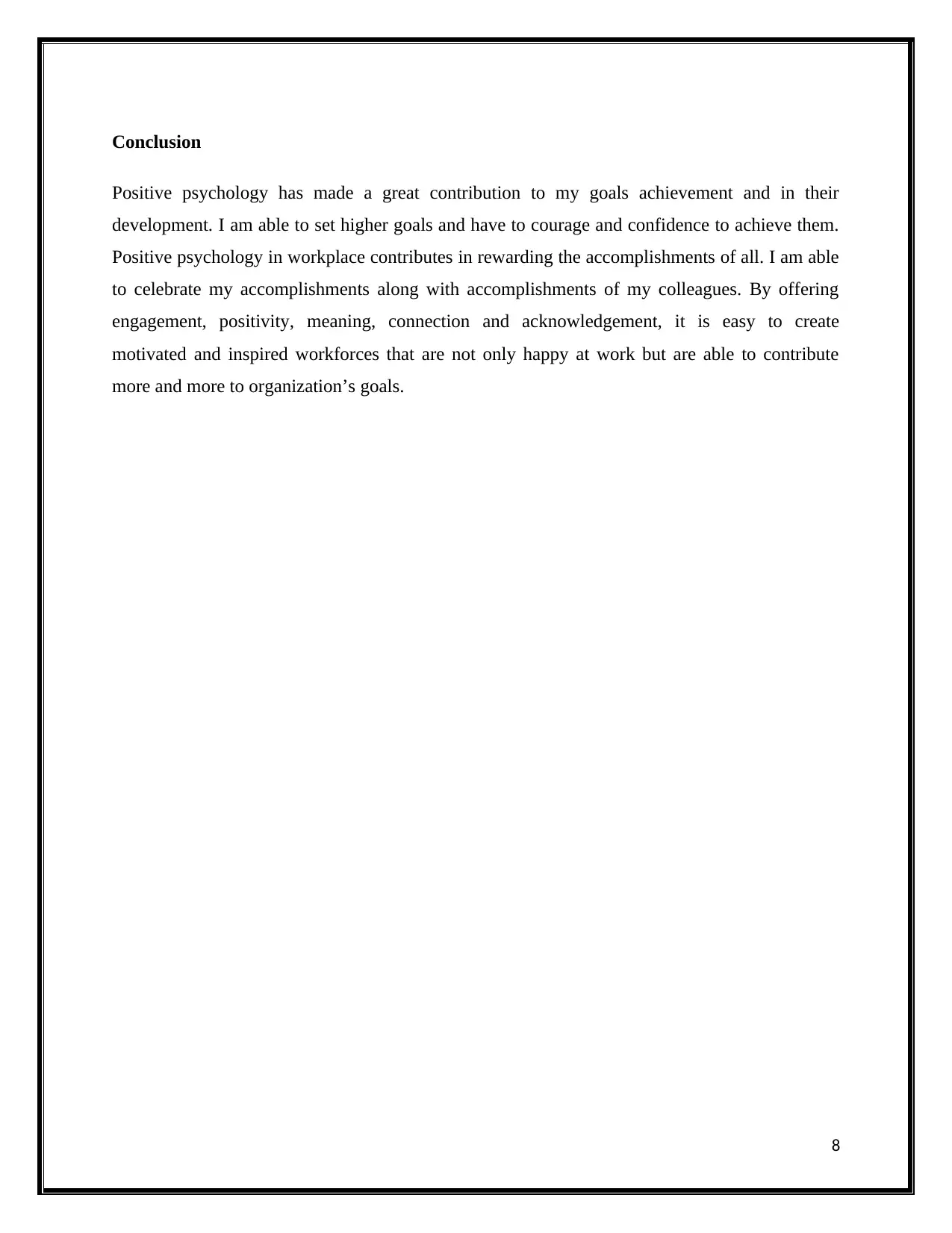
Conclusion
Positive psychology has made a great contribution to my goals achievement and in their
development. I am able to set higher goals and have to courage and confidence to achieve them.
Positive psychology in workplace contributes in rewarding the accomplishments of all. I am able
to celebrate my accomplishments along with accomplishments of my colleagues. By offering
engagement, positivity, meaning, connection and acknowledgement, it is easy to create
motivated and inspired workforces that are not only happy at work but are able to contribute
more and more to organization’s goals.
8
Positive psychology has made a great contribution to my goals achievement and in their
development. I am able to set higher goals and have to courage and confidence to achieve them.
Positive psychology in workplace contributes in rewarding the accomplishments of all. I am able
to celebrate my accomplishments along with accomplishments of my colleagues. By offering
engagement, positivity, meaning, connection and acknowledgement, it is easy to create
motivated and inspired workforces that are not only happy at work but are able to contribute
more and more to organization’s goals.
8
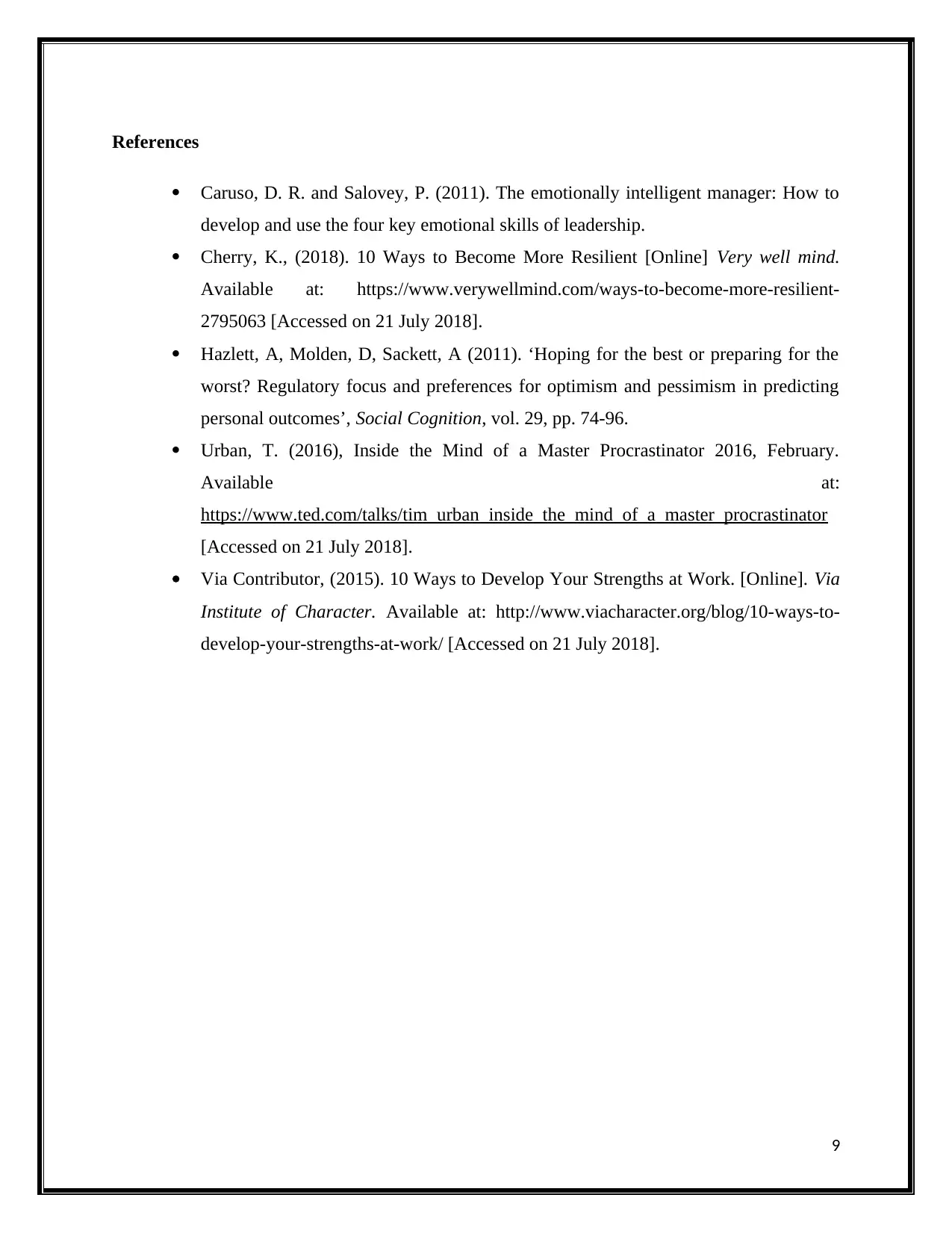
References
Caruso, D. R. and Salovey, P. (2011). The emotionally intelligent manager: How to
develop and use the four key emotional skills of leadership.
Cherry, K., (2018). 10 Ways to Become More Resilient [Online] Very well mind.
Available at: https://www.verywellmind.com/ways-to-become-more-resilient-
2795063 [Accessed on 21 July 2018].
Hazlett, A, Molden, D, Sackett, A (2011). ‘Hoping for the best or preparing for the
worst? Regulatory focus and preferences for optimism and pessimism in predicting
personal outcomes’, Social Cognition, vol. 29, pp. 74-96.
Urban, T. (2016), Inside the Mind of a Master Procrastinator 2016, February.
Available at:
https://www.ted.com/talks/tim_urban_inside_the_mind_of_a_master_procrastinator
[Accessed on 21 July 2018].
Via Contributor, (2015). 10 Ways to Develop Your Strengths at Work. [Online]. Via
Institute of Character. Available at: http://www.viacharacter.org/blog/10-ways-to-
develop-your-strengths-at-work/ [Accessed on 21 July 2018].
9
Caruso, D. R. and Salovey, P. (2011). The emotionally intelligent manager: How to
develop and use the four key emotional skills of leadership.
Cherry, K., (2018). 10 Ways to Become More Resilient [Online] Very well mind.
Available at: https://www.verywellmind.com/ways-to-become-more-resilient-
2795063 [Accessed on 21 July 2018].
Hazlett, A, Molden, D, Sackett, A (2011). ‘Hoping for the best or preparing for the
worst? Regulatory focus and preferences for optimism and pessimism in predicting
personal outcomes’, Social Cognition, vol. 29, pp. 74-96.
Urban, T. (2016), Inside the Mind of a Master Procrastinator 2016, February.
Available at:
https://www.ted.com/talks/tim_urban_inside_the_mind_of_a_master_procrastinator
[Accessed on 21 July 2018].
Via Contributor, (2015). 10 Ways to Develop Your Strengths at Work. [Online]. Via
Institute of Character. Available at: http://www.viacharacter.org/blog/10-ways-to-
develop-your-strengths-at-work/ [Accessed on 21 July 2018].
9
⊘ This is a preview!⊘
Do you want full access?
Subscribe today to unlock all pages.

Trusted by 1+ million students worldwide
1 out of 9
Related Documents
Your All-in-One AI-Powered Toolkit for Academic Success.
+13062052269
info@desklib.com
Available 24*7 on WhatsApp / Email
![[object Object]](/_next/static/media/star-bottom.7253800d.svg)
Unlock your academic potential
Copyright © 2020–2026 A2Z Services. All Rights Reserved. Developed and managed by ZUCOL.





